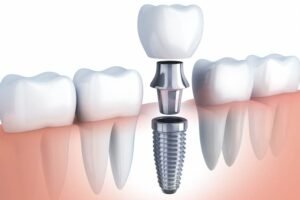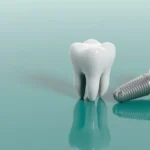Everything You Need to Know About Dental Implants
Dental implants are a popular and effective solution for replacing missing teeth, offering a long-term, durable, and natural-looking alternative to dentures or bridges. Here’s a breakdown of everything you need to know about dental implants.
What Are Dental Implants?
A dental implant is a titanium post that is surgically inserted into the jawbone to serve as a replacement for the root of a missing tooth. Once the implant is in place and fully integrated with the bone, it provides a stable foundation for a crown, bridge, or denture.
The key components of a dental implant are:
Implant: The titanium screw that is embedded into the jawbone.
Abutment: A connector that attaches the implant to the replacement tooth or crown.
Crown: The artificial tooth that is placed on top of the implant, designed to look and function like a natural tooth.
Benefits of Dental Implants
Natural Appearance: Dental implants are designed to mimic the look and feel of natural teeth. The crown is custom-made to match the colour and shape of your surrounding teeth, making it virtually indistinguishable.
Durability: Implants are made from strong, biocompatible materials like titanium. With proper care, they can last for many years, often a lifetime.
Preservation of Jawbone: Unlike dentures, dental implants stimulate the jawbone, helping to prevent bone loss that naturally occurs when teeth are missing.
Improved Function: Implants restore full chewing ability, allowing you to eat and speak without discomfort or worry.
Convenience: Since dental implants are a permanent solution, you won’t need to deal with adhesives or removals, as you would with dentures.
The Dental Implant Procedure
Initial Consultation: Your dentist or oral surgeon will evaluate your mouth, gums, and jawbone to determine if you are a good candidate for implants. X-rays or 3D imaging may be taken to assess bone structure.
Bone Grafting (if needed): If you don’t have enough healthy jawbone to support the implant, a bone graft may be recommended to build up the bone.
Implant Placement: The dental implant is surgically inserted into your jawbone under local anaesthesia or sedation. The bone will gradually fuse with the implant in a process called osseointegration, which can take a few months.
Abutment Placement: Once the implant is fully integrated with the bone, the abutment is attached to the implant to connect it to the crown.
Crown Placement: The final step involves attaching a custom-made crown to the abutment. This crown is designed to match your natural teeth and restore full functionality.
Aftercare for Dental Implants
Maintaining good oral hygiene is crucial for the long-term success of dental implants. Here’s what you need to do:
Brush and Floss Regularly: Treat the implant just like a natural tooth. Brush twice a day and floss to keep the surrounding gums healthy.
Regular Dental Check-ups: Visit your dentist for routine cleanings and examinations to ensure the implant and surrounding tissues stay healthy.
Avoid Hard Foods: While implants are strong, it’s best to avoid excessively hard or sticky foods that could damage the crown.
Are You a Good Candidate?
To be a candidate for dental implants, you need to have:
Healthy gums
Adequate jawbone to support the implant
Good overall oral health
A commitment to maintaining oral hygiene
If you have chronic conditions like diabetes or smoke regularly, you’ll need to discuss with your dentist whether implants are the right option for you, as these factors can affect healing.
Cost of Dental Implants
The cost of dental implants can vary based on the number of teeth being replaced, the need for additional procedures (like bone grafting), and the dentist’s expertise. While implants tend to be more expensive upfront than other options like dentures or bridges, they offer superior durability and longevity, making them a worthwhile investment for many people.
Conclusion
Dental implants provide a long-lasting, natural-looking solution for tooth loss, significantly improving both function and aesthetics. While the process can take several months, the result is a permanent restoration that can last a lifetime with proper care. If you’re considering dental implants, consult with your dentist to see if they’re the right option for you.
For more detailed guidance and professional advice, book a consultation with our qualified dentist!





